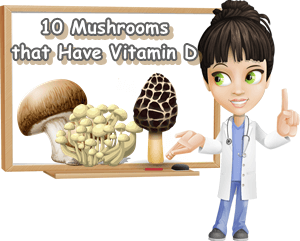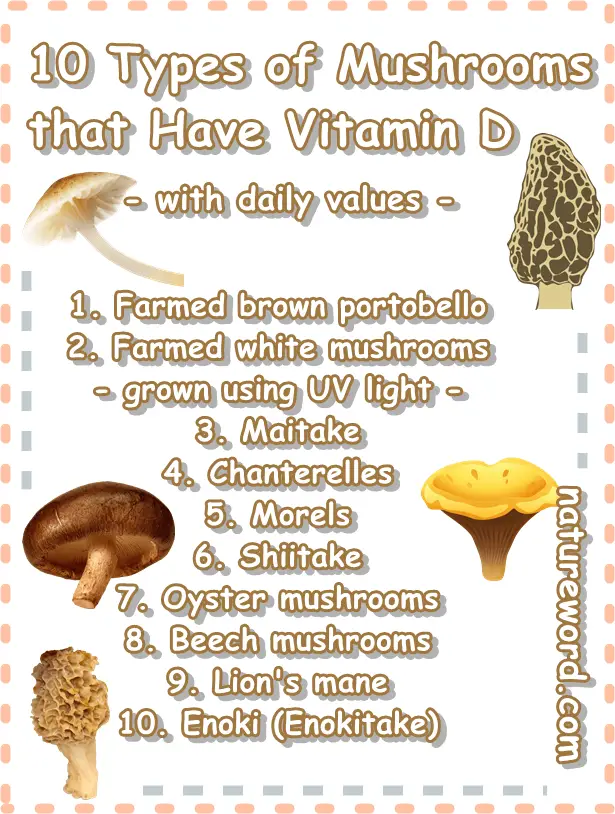Animal foods are the only real viable source of vitamin D in the diet and the only types of foods that contribute measurably to daily values of the vitamin.
However, there are some plant foods that produce vitamin D naturally too, albeit very few.
While the content of vitamin D in plant foods is, for the most part, insignificant, with a few exceptions, the take from this is that there are nevertheless plant foods that have vitamin D.
What are those foods? Read on to find out where in the plant world you can get some vitamin D to supplement your diet with.

1- Farmed brown portobello mushrooms, grown using UV light
Note: Portobello mushrooms are also known as brown portabella, crimini or cremini, champignon or Italian mushrooms.
There are two varieties, brown and white, which are distinguishable only by color.
According to USDA, raw farmed brown portobello mushrooms, grown using ultraviolet light, produce high amounts of vitamin D.
A serving of 100 grams of farmed brown portobello mushrooms, raw, grown using UV light, has 31.9 micrograms of vitamin D which is 159.5% of daily vitamin D values for the average adult. 100 grams is a perfectly decent serving size, one any adult person can have without issues.
One cup of the sliced mushrooms at 72 grams can get you 23 micrograms of vitamin D which covers 115% of all the vitamin D the average adult should get in a day.
Just one brown portobello mushroom, farmed and grown using UV light, at an estimated weight of 20 grams, can get you 6.38 micrograms of vitamin D which covers 31.9% of daily values of the vitamin for an adult person.
Source: USDA nutrition table.

2- Farmed white portobello mushrooms, grown using UV light
Note: White portobello mushrooms are also known simply as white mushrooms, button mushrooms or white button mushrooms, but also white portabella and Italian mushrooms.
A serving of 100 grams of farmed white portobello mushrooms, raw, exposed to ultraviolet light during the growing process has 26.2 micrograms of vitamin D which is 131% of daily values of the vitamin for an adult person.
1 small white mushroom at an estimated weight of 10 grams has 2.62 micrograms of vitamin D which covers 13.1% of daily values of the vitamin for an adult person. 1 medium white mushroom at an estimated weight of 18 grams can get the average adult person 4.72 micrograms of vitamin D which is 23.6% of daily values. 1 large white mushroom at an estimated weight of 23 grams can get the average adult person 6.03 micrograms of vitamin D which is 30.15% of daily values.
One cup of sliced white (portobello) mushrooms at 70 grams has 18.3 which covers 91.5% of all the vitamin D the average adult person should get in a day. Source: USDA nutrition table.
3- Maitake mushrooms
A serving of 100 grams of raw maitake mushrooms can get you 28.1 micrograms of vitamin D which covers 140.5% of daily values for the vitamin for an adult person.
Just 1 cup of diced raw maitake mushrooms at 70 grams can get you 19.7 micrograms of vitamin D which covers 98.5% of daily values of the vitamin for an adult person. Source: USDA nutrition table.
4- Chanterelle mushrooms (golden mushrooms)
100 grams of raw Chanterelle mushrooms can get you 5.3 micrograms of vitamin D which covers 26.5% of daily values of the vitamin for an adult person.
One cup of raw Chanterelle mushrooms at 54 grams can get you 2.86 micrograms of vitamin D which covers 14.3% of daily values of the vitamin for an adult person. Source: USDA nutrition table.
Also see what are the benefits of Chanterelle mushrooms.
5- Morels (morel mushrooms)
100 grams of raw morels can get you 5.1 micrograms of vitamin D which is 25.5% of total daily vitamin D values for the average adult person.
One cup of morel mushrooms at an estimated weight of 66 grams has 3.37 micrograms of vitamin D which accounts for 16.85% of daily values.
Source: USDA nutrition table.
Also see what are the benefits of morels.
6- Shiitake mushrooms
100 grams of dried shiitake mushrooms can get you 3.9 micrograms of vitamin D which covers 19.5% of daily values of the vitamin.
Just 4 dried shiitake mushrooms at an estimated weight of 15 grams can get you 0.585 micrograms of vitamin D which is 2.9% of daily values. Source: USDA nutrition table.
100 grams of raw shiitake mushrooms has 0.4 micrograms of vitamin D which is 2% of daily values of the vitamin for an adult person. Source: USDA nutrition table.
7- Oyster mushrooms
100 grams of raw oyster mushrooms has 0.7 micrograms of vitamin D which accounts for 3.5% of all the vitamin D an adult person needs in a day. One large oyster mushroom at 148 grams can get you 1.04 micrograms of vitamin D which is 5.2% of daily values.
Source: USDA nutrition table.
Also see the benefits of oyster mushrooms.
8- Beech mushrooms
A serving of 100 grams of raw beech mushrooms can get you 0.37 micrograms of vitamin D2 which covers 1.85% of daily values for the average adult person.
Beech mushrooms also have vitamin D4 – a serving of 100 grams provides 0.14 micrograms of vitamin D4 which covers another 0.69% of daily values. See USDA nutrition table.
9- Lion’s mane mushrooms
100 grams of lion’s mane mushrooms, raw, has just 0.2 micrograms of vitamin D which covers 1% of daily values of the vitamin for an adult person. Source: USDA nutrition table.
10- Enoki mushrooms (Enokitake)
100 grams of raw Enoki/Enokitake mushrooms provides 0.1 micrograms of vitamin D which covers just 0.5% of daily values of the vitamin for an adult person.
One cup of Enoki/Enokitake mushrooms at 65 grams has 0.065 micrograms of vitamin D which covers a little over 0.3% of daily values. Source: USDA nutrition table.
Also see the benefits of Enokitake mushrooms.
Note: Mushrooms are the only plant foods that have vitamin D naturally, except for algae (e.g. seaweed, kelp).
Exposure to ultraviolet radiation, either natural or from UV light used in commercial agriculture, triggers the conversion of a vitamin D precursor in mushrooms into vitamin D.
Note: The content of vitamin D in the different types of mushrooms can vary according to growing conditions, even for mushrooms of the same variety.
Farmed mushrooms grown using UV light have a higher content of vitamin D.
Also see Vitamin D Foods List: 60 Foods That Have Vitamin D.
